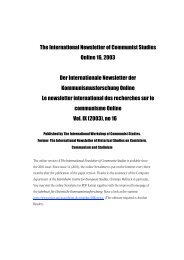Vol. XIII (2007), no 20 - The International Newsletter of Communist ...
Vol. XIII (2007), no 20 - The International Newsletter of Communist ...
Vol. XIII (2007), no 20 - The International Newsletter of Communist ...
Sie wollen auch ein ePaper? Erhöhen Sie die Reichweite Ihrer Titel.
YUMPU macht aus Druck-PDFs automatisch weboptimierte ePaper, die Google liebt.
<strong>The</strong> <strong>International</strong> Newletter <strong>of</strong> <strong>Communist</strong> Studies Online <strong>XIII</strong> (<strong><strong>20</strong>07</strong>), <strong>no</strong> <strong>20</strong> 40<br />
65), and its focus on the hierarchical structure, mechanisms <strong>of</strong> administration and system <strong>of</strong><br />
subordination in the Comintern apparatus.<br />
<strong>The</strong> major task <strong>of</strong> providing the research with academic relevance is two-folded. First, the<br />
methodological approach has from the very beginning intended to put the pieces together by<br />
using different archival collections (Moscow, Berlin, London, Stockholm), in order to obtain an<br />
“inside” perspective on the LAI. Thus, a position like this has made it possible to distinguish<br />
the space <strong>of</strong> human agency in the organization, and to break away from stereotypes and fixed<br />
models. Secondly, previous research has in principal neglected the purpose and functions <strong>of</strong><br />
the front organizations; instead, focus has mainly been put either on the relations between<br />
the national <strong>Communist</strong> Parties and Moscow, or for that matter, the organisational structure<br />
<strong>of</strong> the Comintern apparatus in Moscow. At last, the history <strong>of</strong> Comintern and international<br />
communism is a vital part <strong>of</strong> twentieth century social and political history, and if neglected,<br />
the risk is as journalist Anne Applebaum (<strong>20</strong>03) once pointed out, that the writing <strong>of</strong> the<br />
history <strong>of</strong> the “short twentieth century” becomes somewhat warped.<br />
Research Questions & Limitations<br />
Below follow a couple <strong>of</strong> questions, acting as analytical threads during the research process:<br />
- Why a league against imperialism?<br />
- Which characteristics do the political, social and individual networks reveal in relation to<br />
LAI, and how did the Comintern try to use them?<br />
- Which actors, both individual and institutional, were <strong>no</strong>tably active within the network?<br />
- How did the LAI follow and adjust to the instructions <strong>of</strong> the Comintern headquarters in<br />
Moscow, and vice versa?<br />
- Did a situation <strong>of</strong> struggle and rivalry develop between individuals in the LAI and<br />
other bodies engaged in the anti-imperialist work?<br />
- What position and relevance did front organizations such as the LAI have in, and for, the<br />
Comintern?<br />
<strong>The</strong> thesis deals with the years 1924 to 1933. <strong>The</strong> major focal point is set on LAI’s<br />
<strong>International</strong> Secretariat in Berlin, its organisational and individual composition, and the<br />
relations with Comintern headquarters in Moscow. This limitation has been adopted in order<br />
to concentrate on the axis Berlin – Moscow – Anti-imperialism.<br />
Sources, Archives & Timetable<br />
As previously mentioned, the major bulk <strong>of</strong> empirical material is stored in the Comintern<br />
archive. So far, four research trips have been done to Moscow. 85 Documents and files<br />
representing the apparatus <strong>of</strong> the Comintern (LAI, Political Secretariat, Political Commission,<br />
Agitprop Department, Eastern Secretariat, Executive Committee <strong>of</strong> the Comintern [ECCI],<br />
Western European Bureau, ECCI Presidium, personal files etc.) have been investigated. Other<br />
archives and their collections that provided useful information, are the Federal Archives<br />
Stiftung Archiv der Parteien und Masse<strong>no</strong>rganisationen der DDR (SAPMO) in Berlin, Germany,<br />
85 Research has been carried out in cooperation with supervisor Pr<strong>of</strong>essor Holger Weiss, Dr. Risto<br />
Marjomaa, and assistant Dr. Tatjana Androsova.














